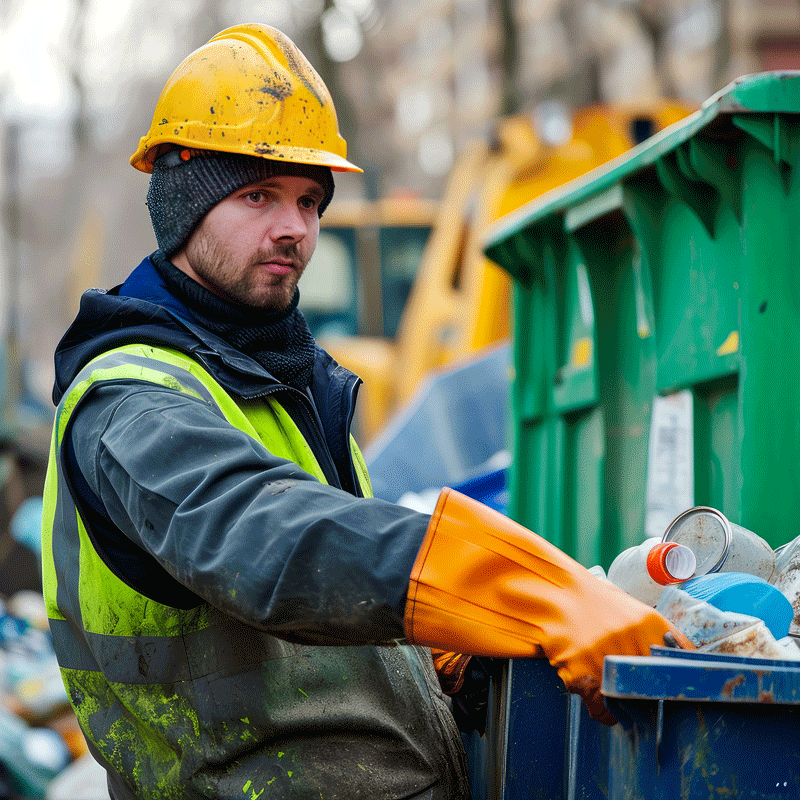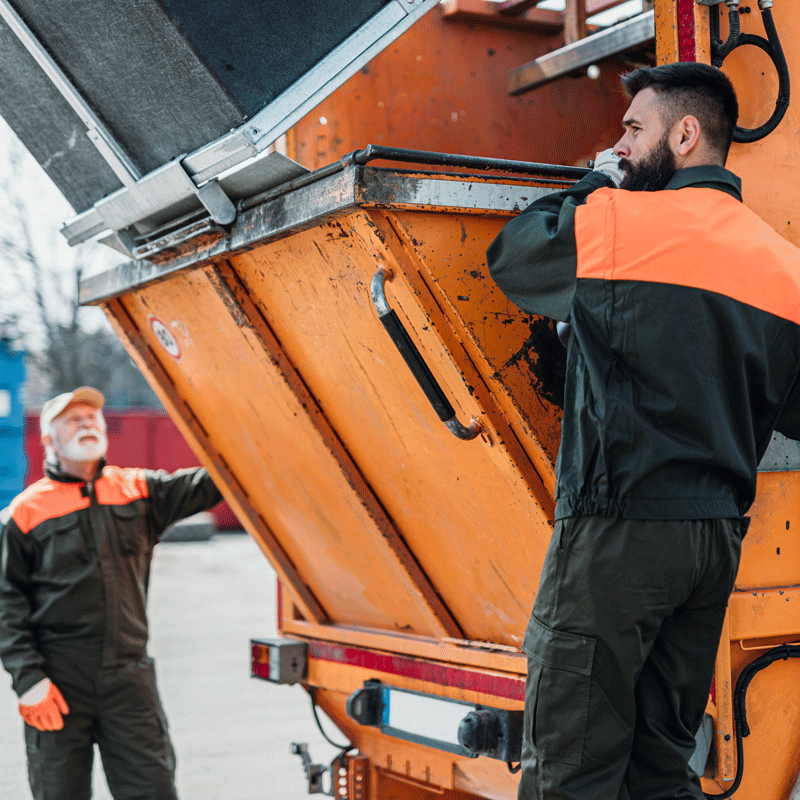
New Business Recycling Rules 2025
This spring will see changes in business recycling rules; here’s all you need to know. This
What type of waste do you need to dispose of?
What’s something all businesses have in common? They all generate waste. Whether you’re a restaurant throwing out food scraps, an office getting rid of stacks of papers, or handling hazardous waste from a construction site, you need a commercial waste provider.
It may not be a glamorous topic, but knowing how to properly handle and dispose of your waste is an essential part of running a business. Failing to do this properly can lead to serious financial and reputational consequences.
But don’t worry about all of that, because that isn’t going to happen to you. Why not? Because you’re about to learn everything you need to know about commercial waste removal.
Commercial waste, sometimes known as business or trade waste, is any waste generated from business activity. This can be anything from construction debris to confidential documents, from glass bottles to old electronics.
Although you can dispose of this yourself (more on that later), most businesses opt for a professional commercial waste disposal service. This can help save you countless hours getting the proper certifications and correctly handling, transporting, and disposing of the waste.
And let’s face it, do you really want to make unnecessary trips back and forth to the skip when you’ve already got a million other things to worry about?
“But what if my business is run from my home?”
Good question.
Even if you’re a freelancer working from your home office or baking delicious cakes as a side hustle in your kitchen, this is still considered business waste. Because of this, it needs to be disposed of in specified commercial waste bins.
And don’t think about sneaking it into your regular bins. If you’re caught, you could face an unlimited fine and 5 years in prison. This is on the more extreme end, but it’s a great example of how seriously the authorities take these things.
Ok, so as we’ve mentioned, there are financial consequences to not dealing with your waste correctly. Below, we’ve listed some of the penalties you could be slapped with for improper waste disposal.
As well as the financial damage improper waste management can do, there are also other types of damage to consider and, in some ways, these can have a more detrimental impact on your business.
They say no press is bad press, but that isn’t the case if you’re in the local paper for breaching waste disposal regulations. Think about it: would you go to a restaurant that’s actively breaking the law?
No matter how good the food is, what other regulations are they breaking if they’re not disposing of their waste correctly? Are they handling and storing food properly? Are their facilities clean?
It can be hard to come back from a reputational hit like that. No matter how far you’ve come, to some people, you will always be the business that got fined for breaching waste disposal regulations.
Keeping your business green should always be a priority when dealing with your waste. Not disposing of this correctly can seriously affect the local environment and wildlife.
You’ll likely use hazardous chemicals and materials if you work in manufacturing or construction. If these aren’t handled and disposed of properly, they can leak into water and soil supplies, impacting the human and animal populations.
Healthcare facilities and tattoo parlours must correctly dispose of biological waste and used needles. If they aren’t handled correctly then they can pose a unique risk of biohazard. This can lead to other humans becoming contaminated with transferable diseases like hepatitis and HIV.
Businesses produce a range of different types of commercial waste. A construction site will create wildly different types of waste than an office. Below, we’ve outlined some of the most common types of waste businesses are likely to produce.
You’ll often find general waste in offices, which consists of non-recyclable and non-hazardous materials. Paper, packaging, disposable items like non-recyclable plastics, that kind of thing.
Pretty self-explanatory. It’s literally just cardboard and paper, so includes old stacks of paper, shredded documents, cardboard boxes, and packaging.
This consists of old electronic devices. Things like old computers, mobile phones, printers and wiring. This is obviously a common thing in modern businesses.
This is waste that poses a risk to human or environmental health. Solvents, chemicals, batteries, and certain medical waste fall under this category. They are in a unique category as they must follow a series of hazardous waste regulations.
Anything that involves medical or human procedures. This is most common in the healthcare, cosmetics, and tattooing industries and includes things like surgical waste, disposable gloves, animal-related biomedical waste and used needles or sharps.
Confidential waste is waste that contains sensitive information about either your business or your customers. It includes client contracts, financial statements, and patient records. You have a duty of care to protect your customer’s personal information. Failure to do so is a one-way ticket to some very serious legal complications.
What type of waste do you need to dispose of?
Everyone. If you run a business, you generate waste. If you generate waste, you must handle and dispose of commercial waste properly. If you don’t, then you get slapped with all the fines and penalties we’ve already discussed.
Whether your business is in the hospitality industry, retail industry, healthcare industry or construction industry, you will be producing waste. The fact your business produces waste means you need a waste management plan, and the type of plan you need will mainly depend on your industry.
There are a lot of different regulations and obligations that you have to follow as a business. These can be quite confusing, but ignorance isn’t an excuse and won’t hold up in a court of law. Luckily, we’ve broken down the ones most likely to concern you and your business below.
This act prohibits the unauthorised deposit, treatment, or disposal of controlled or extractive waste on land without a specific environmental permit.
This legislation governs the production, transportation, and disposal of hazardous waste. Offences include failing to notify premises where hazardous waste is produced, not consigning hazardous waste correctly, and improper mixing of hazardous waste.
These regulations impact electrical and electronic equipment products. They are required to finance waste equipment collection, treatment, and recycling. Not registering as a producer, not meeting recovery and recycling obligations, and improper labelling of products are considered offences.
This legislation mandates that individuals transporting controlled waste must possess a waste-carrying licence. Failure to provide the correct documentation when asked is a breach of this act.
These regulations stipulate that all businesses must provide written information about their waste transfer. This is known as adhering to the waste hierarchy.
Duty of care is a term used to refer to rules you, as a business owner, must follow when it comes to your waste. This is a law that requires you to store and handle any waste your business produces correctly.
You also have to do your due diligence on commercial waste companies. This is because you must only give your waste to registered handlers who are authorised to take it.
Not all commercial waste removal companies are created equal. Each will come with its stipulations, while your specific needs will also come into play. The four main points of consideration are:
As is the case with most things, the cost of commercial waste collection depends on how difficult it is for your provider to provide you with the services you need. If, for example, you run a construction company in an isolated part of the Lake District, all the heavy metals, acids, paints, and other construction debris you produce will mean a waste removal company is going to find it hard to provide you with what you need. In this case, your business would face high costs.
If, however, you’re a self-employed graphic designer working from a flat in central London and only occasionally having to throw papers and other documentation then any waste management company will be able to meet your requirements with ease.
The fact that one of the businesses described above needs less frequent collections of non-hazardous waste at a smaller volume from an urban area means the deal they get will be cheaper. Obviously, you can’t really change if your business produces certain types of waste by its nature and, if this does describe your business, you probably already know that your waste management would cost more than most businesses. The best way to find out exactly how much your waste management will cost is to answer the question below; we’ll then be able to connect you directly with a provider that suits your needs and budget.
What type of waste do you need to dispose of?
Although it will vary from provider to provider, you may be able to choose between two types of collections.
Recurring collections can provide cost savings through efficiency and potential discounts for long-term contracts. One-off collections offer more flexibility but at the trade-off of a higher price per collection.
But which is better? Well, that’s up to you and your specific business…
Recurring Collections
These are regular, scheduled waste pickups, daily, weekly, or monthly. They’re tailored to your specific needs and are often cheaper than one-off collections (based on price per collection). This is due to their predictability, and some providers may even offer discounted rates for longer-term contracts, translating into even more savings.
One-Off Collections
These are ad-hoc services arranged as needed. Although they’re flexible, you’ll pay more per pickup. The lack of schedule will result in higher operational costs, which the providers must pass on to you.
There are many different providers out there. Some may be better suited to your needs than others. There are a few tips to remember when finding the best one for you.
Always check the reviews before signing anything. If you get one or two that say they’re terrible, probably take these with a pinch of salt. But if you see multiple people mention the same problem, stay well away from them.
If your business could benefit from a professional commercial waste disposal service, then we can help!
All you have to do is tap the “Get Free Quote” button below, answer a few quick questions about your business, and receive a quote tailored to your specific needs. All quotes are non-committal and 100% free, so get yours now!
This will depend on four main factors:
It will be cheaper to have the service collect papers from your city office once a month rather than have hazardous waste collected from a remote location on a weekly basis.
Absolutely, but there are some boxes you must check to ensure you do this legally.
The first step is to register as a “registered waste carrier.” If you’re doing this only for yourself, then registration is free. If you intend on collecting and disposing of other businesses’ commercial waste, then it is £154.
You must dispose of the waste per regulations and keep records of your waste disposal for at least two years (three years for hazardous waste).
If you dispose of your waste illegally, you may be punished with an unlimited fine or up to 5 years in prison.
Duty of care in waste management is a law that all businesses must follow. It requires them to store and handle their waste correctly. It also covers the legal obligation to give their waste to qualified management companies authorised to do so.

This spring will see changes in business recycling rules; here’s all you need to know. This

Your guide to the best waste solutions for your business. Your guide to the best waste

While it’s a boring topic, having a good waste plan is key to your business. Here’s



Commercialexperts.com helps savvy UK businesses to save time and money by comparing a wide range of essential products and services.
© TFLI 2025 All rights reserved. Licenced by the Information Commissioners Office, (Registration Number Z3585914) Registered in the UK, number 08424810. Registered Office Address: First Floor, Beechwood Court, Springwood Way, Tytherington Business Park, Macclesfield, Cheshire. SK10 2XG.